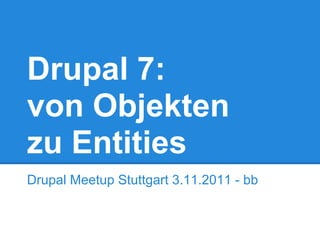
Drupal Entities
- 1. Drupal 7: von Objekten zu Entities Drupal Meetup Stuttgart 3.11.2011 - bb
- 2. Drupal 6: Objekte mit proprietären APIs Objekte sind z.B. - Nodes - Terms - User - Blocks - Files Felder -> CCK ! (nur für Nodes)
- 3. Drupal 6: Objekte mit proprietären APIs Beispiele: node_load( $param = array(), $revision = NULL, $reset = NULL) user_save($account, $array = array(), $category = 'account') file_delete( $path) taxonomy_get_term_by_name($name)
- 4. Drupal 6: Objekte mit proprietären APIs Beispiele: node_load( $param = array(), $revision = NULL, $reset = NULL) user_save($account, $array = array(), $category = 'account') file_delete( $path) taxonomy_get_term_by_name($name) Problem: - uneinheitliche Behandlung durch spezifische APIs - Felder nur über contributed modules (CCK, Content Profile, ...)
- 5. Ziel: Vereinheitlichung - Objekt & CRUD-API Ein Objekt kann - erzeugt werden (Create) - gelesen werden (Read) - verändert werden (Update) - gelöscht werden (Delete)
- 6. Ziel: Vereinheitlichung - Objekt & Field-API Zu JEDEM Objekt können beliebige Felder angelegt werden - Text - Zahlen - Links - Referenzen - Dateien - ... Auch diese können gelesen, verändert, gelöscht werden.
- 7. Drupal 7: Voilá, Entities ! Konzepte: Beispiele: - Entity Types - node, user, vocabulary - Entity Bundles - page, article, blog - Entity Properties - author, created, status - Fields - field_xyz & Entity API / Field API
- 8. Codevergleich Drupal 6 <-> Drupal 7 Drupal 6 (Database API + Node API) $query = "SELECT nid FROM {node} WHERE (type = 'article' AND status = '1') ORDER BY created DESC"; $result = db_query($query); while ($nid = db_result($result)) { $articles[] = node_load($res); } Drupal 7 (Entity API): $query = new EntityFieldQuery(); $result = $query->entityCondition ('entity_type', 'node') ->entityCondition ('bundle'), 'article') ->propertyCondition ('status', '1'); ->propertyOrderBy ('created', 'DESC'); ->execute(); $articles = entity_load ('node', array_keys($result['node']);
- 9. Abstraktionsebene: Entity Controller Drupal 6: Drupal 7: Modul Modul API Entity Controller Daten API Daten
- 10. Bsp: Drupal Variablen als Entities /** class VariableController extends * Implements hook_entity_info() DrupalDefaultEntityController { */ } function variables_entity_info() { function variable_load($variable_id = NULL, $reset = FALSE) { $info['variable'] = array( $variable_ids = (isset($variable_id) ? 'label' => t('Drupal Variable'), array($variable_id) : array()); $variable = variable_load_multiple($variable_ids, 'controller class' => 'VariableController', $reset); 'base table' => 'variable', return $variable ? reset($variable) : FALSE; 'uri callback' => 'variable_uri', } 'fieldable' => FALSE, function variable_load_multiple($variable_ids = array(), $conditions = array(), $reset = FALSE) { 'entity keys' => array('id' => 'name'), return entity_load('variable', $variable_ids, 'static cache' => TRUE, $conditions, $reset); } 'bundles' => array( function variable_uri($variable) { Entity Controller 'variable' => array('label' => 'Variable'), return array( ), 'path' => 'variable/' . $variable->name, ); 'view modes' => array( } 'full' => array('label' => t('Full'), function variables_field_extra_fields() { 'custom settings' => FALSE), $fields = array(); $fields['variable']['value'] = array( ) 'form' => array( ); 'name' => array( 'label' => t('value'), return $info; 'description' => t('Variable Value'), } ), ), ); return $fields; }
- 11. Bsp: Drupal Variablen als Entities /** * Implements hook_menu() */ function variable_list() { function mymodule_menu() { $query = new EntityFieldQuery(); $items['variable/%variable'] = array( $result = $query->entityCondition 'title callback' => 'variable_page_title', ('entity_type', 'variable') 'title arguments' => array(1), ->propertyOrderBy('name','DESC') 'page callback' => 'variable_page_view', ->execute(); 'page arguments' => array(1), $variables = entity_load('variable', 'type' => MENU_CALLBACK, array_keys($result['variable'])); 'access callback' => TRUE, ); $output = ''; $items['variablelist'] = array( foreach($variables as $var){ Custom Module 'title' => 'List of Variables', 'page callback' => 'variable_list', $output .= l($var->name,'variable/' . 'type' => MENU_CALLBACK, $var->name) . '<br />'; 'access callback' => TRUE, } ); return $output; } return $items; } function variable_page_title($variable) { return 'Variable: ' . $variable->name; } function variable_page_view($variable) { return '<' . $variable->value . '>'; }
- 12. Ausgabe des Variablen-Beispiels /variablelist: /variable/user_picture_dimensions:
- 13. Drupal 7: Vieles ist schon da, aber... Beispiele aus dem D7 Core API: function node_load($nid = NULL, $vid = NULL, $reset = FALSE) { $nids = (isset($nid) ? array($nid) : array()); $conditions = (isset($vid) ? array('vid' => $vid) : array()); $node = node_load_multiple($nids, $conditions, $reset); return $node ? reset($node) : FALSE; } function node_load_multiple($nids = array(), $conditions = array(), $reset = FALSE) { return entity_load('node', $nids, $conditions, $reset); }
- 14. Drupal 7: Vieles ist schon da, aber... Beispiele aus dem D7 Core API: function node_load($nid = NULL, $vid = NULL, $reset = FALSE) { $nids = (isset($nid) ? array($nid) : array()); $conditions = (isset($vid) ? array('vid' => $vid) : array()); $node = node_load_multiple($nids, $conditions, $reset); return $node ? reset($node) : FALSE; } function node_load_multiple($nids = array(), $conditions = array(), $reset = FALSE) { return entity_load('node', $nids, $conditions, $reset); } function taxonomy_get_term_by_name($name) { return taxonomy_term_load_multiple(array(), array('name' => trim($name))); } function taxonomy_term_load_multiple($tids = array(), $conditions = array()) { return entity_load('taxonomy_term', $tids, $conditions); }
- 15. Drupal 7: Vieles ist schon da, aber... Vieles ist noch unvollständig: - Remember CRUD? Im Core gibt es nur das "R" ! - Es gibt noch kein User Interface zu Entities - Integration z.B. in Views, Panels, Rules, Features, Pathauto, Display Suite, ... Manches ist nur vorläufig: function taxonomy_get_term_by_name($name) { return taxonomy_term_load_multiple(array(), array('name' => trim($name))); } function taxonomy_term_load_multiple($tids = array(), $conditions = array()) { return entity_load('taxonomy_term', $tids, $conditions); } Die Verwendung von $conditions ist deprecated, und wird in D8 wahrscheinlich wieder verschwinden!
- 16. Abhilfe: Contributed Modules Entity API - Ergänzt das Core API, z.B. mit vollständigem CRUD http://drupal.org/project/entity File Entity - Macht Files fieldable http://drupal.org/project/file_entity Entity Construction Kit (ECK) - User Interface zur Verwaltung von Entities http://drupal.org/project/eck Entity Reference - Referenzen auf Entities, ähnlich node / user reference http://drupal.org/project/entityreference Manches wird mit D8 im Core landen, anderes in der Versenkung verschwinden - schwer zu beurteilen!
- 17. Demo: ECK, Views, DB - Erzeugen von Entity Types, Bundles, Entities - Listen in Views - Repräsentation in der Datenbank
- 18. Fragen / Diskussion Zum Weiterlesen: http://www.davetech.com/blog/introduction_drupal_7_entities_and_fields http://www.istos.it/category/blog-tags/drupal-entities http://de.wetena.com/blog/2011/04/13/entities-in-drupal-7 http://www.slideshare.net/alexshr/entity-api Diese Folien als PDF: http://www.slideshare.net/drubb/drupal-entities
